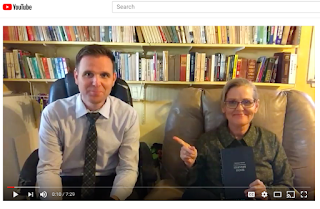Linda L. Zern's Blog, page 9
July 18, 2018
How To Talk To Yourself
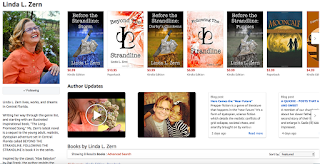
I read that intelligent people talk to themselves. It’s true. I know because I’m intelligent, and I talk to myself. A lot. I also know because I read it on the Internet, so it must be true. One of my granddaughters asked me, “YaYa? Why you talk you’self all the time?”
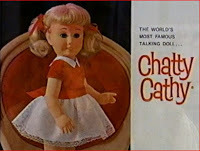 “Because, kid, I’m the only one listening to me.”And to figure out if I’m worth listening to at all. Talking to yourself is good for developing arguments, working through puzzles, reviewing conversations, and testing out syntax and vocabulary. It can also make you look as crazy as a loon.But brainstorming with your own brain is efficient; your less likely to have to endure the eyeroll of disdain from your own eyes, or the shoulder shrug of indifference from your own shoulders. It’s less group. More work.And there’s no one to tell you that you can’t turn that project/idea/experiment upside down and inside out to see if it glitters better in the moonlight than the sunshine.Talking to yourself, I’m for it.However . . . As a dedicated self-talker I’ve run into a bit of a snag. I’m at the point where I’ve talked to myself so long, that sometimes I say things out loud that I only think I’ve thought, and then I repeat myself and people say, “Hey, you just said that.” And I say, “No, I just thought that in my thinker, better known as my brain.” And they say, “You’re nuts.”So, that’s what I think about that.Excuse me, I have to go talk this over—with myself.
“Because, kid, I’m the only one listening to me.”And to figure out if I’m worth listening to at all. Talking to yourself is good for developing arguments, working through puzzles, reviewing conversations, and testing out syntax and vocabulary. It can also make you look as crazy as a loon.But brainstorming with your own brain is efficient; your less likely to have to endure the eyeroll of disdain from your own eyes, or the shoulder shrug of indifference from your own shoulders. It’s less group. More work.And there’s no one to tell you that you can’t turn that project/idea/experiment upside down and inside out to see if it glitters better in the moonlight than the sunshine.Talking to yourself, I’m for it.However . . . As a dedicated self-talker I’ve run into a bit of a snag. I’m at the point where I’ve talked to myself so long, that sometimes I say things out loud that I only think I’ve thought, and then I repeat myself and people say, “Hey, you just said that.” And I say, “No, I just thought that in my thinker, better known as my brain.” And they say, “You’re nuts.”So, that’s what I think about that.Excuse me, I have to go talk this over—with myself.Linda (Chatty Cathy) Zern
Published on July 18, 2018 05:09
June 20, 2018
Here Comes the "Near Future"
Prepper fiction is a genre of literature that happens in the "near future." It's a form of dystopian, science fiction which details the realistic conflicts of grid collapse, societal chaos, and anarchy brought on by various catastrophes. Prepper fiction is fiction that could happen--tomorrow. Near future. Less fantasy and more reality based it is a genre that many readers find disturbing, to say the least.
This is a world that could happen, would happen, and has happened. See: Venezuela, Puerto Rico, Darfur, to name a few . . .
My newest short story is a grid collapse scenario from the point of view of a child, Darby Summerlin. The Strandline Series: Beyond the Strandline (Book I) & Following the Strandline (Book II) examines life and survival seven years after the event horizon . . .
Storm, Darby's Chickens & Puppies are prequel, short story tie-ins detailing both the horrors and the triumphs of Darby and her family . . . Find these and more @ amazon.com/author/lindazern
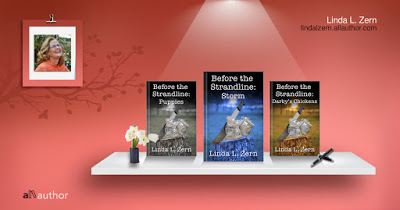
This is a world that could happen, would happen, and has happened. See: Venezuela, Puerto Rico, Darfur, to name a few . . .
My newest short story is a grid collapse scenario from the point of view of a child, Darby Summerlin. The Strandline Series: Beyond the Strandline (Book I) & Following the Strandline (Book II) examines life and survival seven years after the event horizon . . .
Storm, Darby's Chickens & Puppies are prequel, short story tie-ins detailing both the horrors and the triumphs of Darby and her family . . . Find these and more @ amazon.com/author/lindazern

Published on June 20, 2018 10:23
June 18, 2018
A QUICKIE - POSTS THAT ARE SHORT AND SWEET
A member of our church told a story about her clever father removing the second story of their house to re-build and enlarge it. Sadie (9) was quite impressed.
She said, "Wow, he took off the top of their house."
I said, "Boy, your dad sure couldn't do that."
She thought for a moment, "Nope. But my mom could."
She said, "Wow, he took off the top of their house."
I said, "Boy, your dad sure couldn't do that."
She thought for a moment, "Nope. But my mom could."
Published on June 18, 2018 15:01
May 11, 2018
Youth Sports and Other Myths
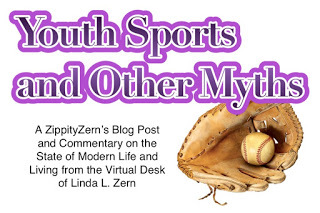
On Rose Marie Drive in Titusville (circa the Space Race) all the kids in my neighborhood played sandlot ball: kick, base, stick. The big kids always got to bat. The little kids always got gypped until they got to be big kids.
The fights were real. The solutions were up to us. The rules were of our own making. Parents were not involved until and unless there was blood or a death.
And then the grownups invented Little League.
Before the leagues—soccer, basketball, softball, football, baseball . . . before the teams—swim, cheer, track . . . before the grownups, children were free. They were free to work out their problems, organize their activities, and experiment with the complexities of inter-personal batting line-ups.
And then grownups invented uniforms.
A lot of kids didn’t own gloves. They played bare-handed or they switched off with the opposite team. We learned to share if we wanted to play. The “field” was an empty lot in the subdivision. We used chunks of construction drywall for bases. We learned to be innovative.
And then grownups discovered regulation: gloves, bats, balls, fields.
In sandlot ball one person owned the equipment, usually the kid that just had a birthday. And there was always the possibility that birthday kid would get ticked off, take his/her ball or bat, and go home. Negotiations and conflicts constantly teetered on the razor edge of collapse. We became master diplomats.
And then grownups created ALL the rules.
Nothing about sandlot ball is fair. Nothing. The big strong ones got to pitch, bat, and field. The little ones got stuck sitting on a cement block hoping for mercy from the big and the strong. It made us hungry to get better, bigger, stronger, more. It gave us a clear vision of how the world worked—get scrappy or take a seat. Winning mattered.
And then grownups took up a collection so that everyone would get a pointless, meaningless trophy.
I attended my granddaughter’s softball game yesterday. It was organized, orderly, and sanitized. Adults umpired, coached, and cheered. Little girls shrieked and stomped encouragement at each other. It was fun.
But it wasn’t sandlot ball.
Linda (Last Up) Zern
Published on May 11, 2018 06:49
April 30, 2018
April 10, 2018
The Strandline Book Shelf
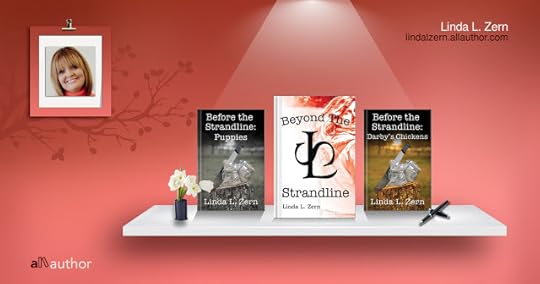
Book I of the Strandline Series, Beyond the Strandline and two prequel short stories in the Strandline Series. amazon.com/author/lindazern
Published on April 10, 2018 15:57
April 9, 2018
FICTION: A Dry Run For Life!!

My youngest son, Adam, just turned thirty-three; so doing the math, that makes me seventy times seventy. Or is that how many times he has to forgive me? Well, whatever.
Adam is my philosopher king. He’s the kid who is happy to give me less than five stars on my various full-length novels. The Amazon.com gods worry that our children or family will be overly positive when it comes to leaving reviews on their website, so they forbid such. I never have to worry about that.
He’s also the child that likes to engage me in a plethora of idea related debates. Then he films our discussions. And then he posts these interactions on line.
I’m not sure how I feel about this.
He never lets me put on makeup or change my shirt, and I’ve usually just finished cooking Sunday dinner for a mob of beggars so there may or may not be gravy stains on my clothing. The only light he provides is an electric GE camping lantern, if he can find it. So, half the time I look like I’ve smeared gravy in the bags under my eyes. And there’s never any rehearsal. It’s just shoot from my gravy stained hip. That I’m okay with.
The next debate he’s scheduled is titled, The Value of Reading Fiction, and on this topic, we’re probably going to be in sync. Fiction makes everything clearer.
For example: Thomas Tryon, a horror writer in the 1970’s wrote a truly cautionary tale called Harvest Home. In it, he detailed a remote northern town whose corn cult required human sacrifice and a fertility ceremony. I read it and made notes: never move north, never become a corn farmer, and never, ever peak at the secret “corn making” ceremony if you want to keep your tongue and your eyes. Sure, it’s fiction, but you never can tell.
Stephen King wrote a book about vampires before the vampires got sexy. My husband worked nights at the time, slept days, and I never saw him conscious when the sun was out. Never. I read Salem’s Lot and learned how to recognize a vampire when I saw one. It’s not a coincidence that the town where vampires were crawling all over the town dump was somewhere up north, probably next to the corn cult creeps.
And who, after reading Pat Frank’s Alas Babylon, doesn’t understand the importance of storing up salt against a nuclear attack from Russia. I’m ready.
Every work of fiction provides dry runs for life. What would you do if? What would you think when? How would you cope after? Where do you go during?
When we read books, we walk into worlds that don’t exist and face monsters that can’t be true, but at the end of every imaginary journey is the possibility that we will discover some small gem of truth that will aid us on our way in the real world above the fiction.
Linda (Ready For My Close Up) Zern
Published on April 09, 2018 13:00
A Dry Run

My youngest son, Adam, just turned thirty-three; so doing the math, that makes me seventy times seventy. Or is that how many times he has to forgive me? Well, whatever.
Adam is my philosopher king. He’s the kid who is happy to give me less than five stars on my various full-length novels. The Amazon.com gods worry that our children or family will be overly positive when it comes to leaving reviews on their website, so they forbid such. I never have to worry about that.
He’s also the child that likes to engage me in a plethora of idea related debates. Then he films our discussions. And then he posts these interactions on line.
I’m not sure how I feel about this.
He never lets me put on makeup or change my shirt, and I’ve usually just finished cooking Sunday dinner for a mob of beggars so there may or may not be gravy stains on my clothing. The only light he provides is an electric GE camping lantern, if he can find it. So, half the time I look like I’ve smeared gravy in the bags under my eyes. And there’s never any rehearsal. It’s just shoot from my gravy stained hip. That I’m okay with.
The next debate he’s scheduled is titled, The Value of Reading Fiction, and on this topic, we’re probably going to be in sync. Fiction makes everything clearer.
For example: Thomas Tryon, a horror writer in the 1970’s wrote a truly cautionary tale called Harvest Home. In it, he detailed a remote northern town whose corn cult required human sacrifice and a fertility ceremony. I read it and made notes: never move north, never become a corn farmer, and never, ever peak at the secret “corn making” ceremony if you want to keep your tongue and your eyes. Sure, it’s fiction, but you never can tell.
Stephen King wrote a book about vampires before the vampires got sexy. My husband worked nights at the time, slept days, and I never saw him conscious when the sun was out. Never. I read Salem’s Lot and learned how to recognize a vampire when I saw one. It’s not a coincidence that the town where vampires were crawling all over the town dump was somewhere up north, probably next to the corn cult creeps.
And who, after reading Pat Frank’s Alas Babylon, doesn’t understand the importance of storing up salt against a nuclear attack from Russia. I’m ready.
Every work of fiction provides dry runs for life. What would you do if? What would you think when? How would you cope after? Where do you go during?
When we read books, we walk into worlds that don’t exist and face monsters that can’t be true, but at the end of every imaginary journey is the possibility that we will discover some small gem of truth that will aid us on our way in the real world above the fiction.
Linda (Ready For My Close Up) Zern
Published on April 09, 2018 13:00
March 21, 2018
Goats and the Truth About Opinions
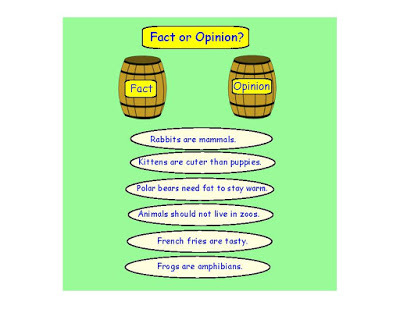 If I say, “I love goats. Goats be fun,” are these statements opinions or facts? Or are these statements a combination of both opinion and fact? Or are these declarations the ravings of the madwoman of Kissimmee Park Road?
If I say, “I love goats. Goats be fun,” are these statements opinions or facts? Or are these statements a combination of both opinion and fact? Or are these declarations the ravings of the madwoman of Kissimmee Park Road?First, for our discussion, let’s examine the difference between opinion and fact. An opinion is a belief or judgment that is NOT based on measurable evidence, and a fact is provable on a color-coded graph.
Can it be proved that I, in fact, do love goats?
I own goats. I take care of goats. I talk of goats. I talk to goats. I preach of goats, and I post pictures of goats in public places, next to thousands of kitten and puppy pictures
.
It is arguable that I do love goats by a measurable rubric.
Now, let's examine the statement, “Goats be fun.” This can be refuted and often is by my son-in-law. He finds farm animals a curiosity, at best, and, at worst, an abomination. Of course, he was born in Bountiful, Utah where all the children and goats are above average.
The statement “Goats be fun,” is an opinion. Many people find farm animals a smelly bother or a confusing chore or a strain on the delicate balance of an entire planet.
Farm animals poop and fart. This is a measurable fact.
My Muslim neighbor finds goats tasty, and I can prove it.
Buck goats smell rank when they’re in “love.” (If you need proof, come on over sometime during the mating season.) Girl goats find boy goat stink irresistible. Truth. An invitation. Also True.
Boy goats pee on their own faces. True.
It’s horrifying when boy goats drink their own pee. Opinion.
Goats have the cutest babies on earth. Opinion. If someone else refutes the ‘cutest baby goat claim’ by saying, “Hedgehogs have the cutest babies ever, and you’re a disgusting, offensive idiot for claiming otherwise,” then you’ve got yourself a debate. Opinions, which are not facts but feelings about facts, lend to debate. Debates are the mother’s milk of free speech and protected by law in our country.
When someone accuses you of being a disgusting, offensive idiot, then it’s opinion. It’s very difficult to demonstrate a level of idiocy on a flip chart. Or is it? Let me think about that.
Summation: Freedom is hard. Free speech is challenging. Feelings are not facts. Statistics can make fact-finding tricky because of the innate biases and prejudices of the fact-finding team coloring those pie pieces on those charts.
I love debate. Fact. And I can show you on a bar chart demonstrating why that’s absolutely true.
Linda (Hold Your Horses) Zern
Published on March 21, 2018 09:18

